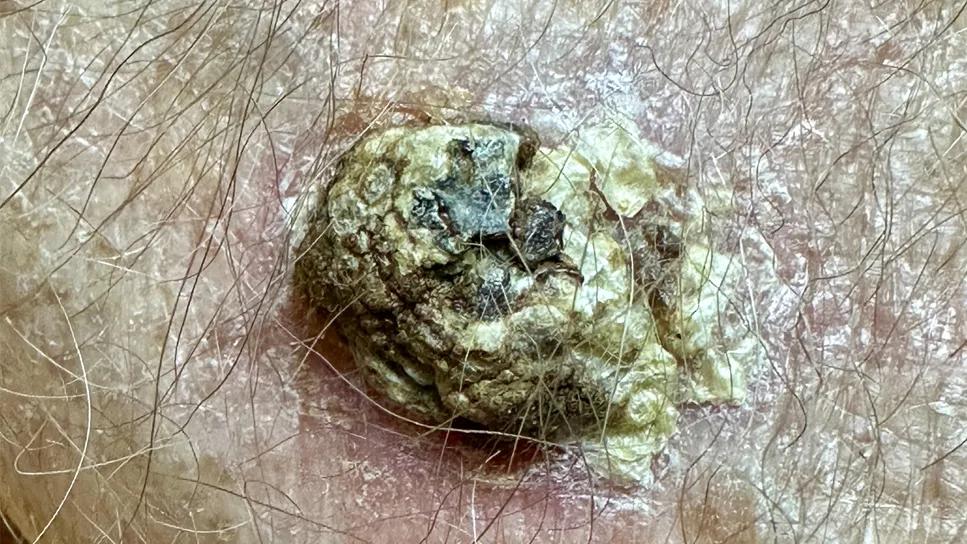Pembrolizumab does not improve outcomes, but immunotherapy may still offer benefit

Image content: This image is available to view online.
View image online (https://assets.clevelandclinic.org/transform/7cd8a67c-0687-4aaf-ae56-6e6f3ced659b/pembro-vs-pbo-squamous-cell-carcinoma-1957132068)
Squamous cell carcinoma
Adjuvant pembrolizumab did not significantly improve progression-free survival compared with placebo in patients with high-risk, locally advanced, cutaneous squamous cell carcinoma (cSCC) following surgery and radiation, according to a Cleveland Clinic-led randomized trial data presented at the American Society of Clinical Oncology 2025 Annual Meeting. However, data suggests the immunotherapy might still offer benefit in reducing cancer recurrence.
Advertisement
Cleveland Clinic is a non-profit academic medical center. Advertising on our site helps support our mission. We do not endorse non-Cleveland Clinic products or services. Policy
"Pembrolizumab did not provide significant benefit in the adjuvant setting for patients with resected, high-risk, locally advanced cSCC," says Shlomo Koyfman, MD, a radiation oncologist at Cleveland Clinic Cancer Institute and co-principal investigator of the KEYNOTE-630 trial. "But when we drilled deeper, what we found was that the chances of the cancer coming back were dramatically reduced – about a 50 percent reduction in recurrence rates."
Cutaneous squamous cell carcinoma is one of the most common cancers, with more than one million cases diagnosed annually. While most cases are curable with surgery alone, approximately 5-10 percent present as higher-risk tumors that require more aggressive treatment.
The phase 3, randomized, double-blind trial enrolled 450 patients across 30 countries who had undergone surgery and completed adjuvant radiation for high-risk, locally advanced cSCC. Participants were randomized 1:1 to receive either pembrolizumab 400 mg or placebo intravenously once every six weeks for nine cycles.
While pembrolizumab showed a 24 percent reduction in the risk of recurrence or death compared with placebo (HR 0.76 [95% CI, 0.53-1.10]), the reduction was not statistically significant. Locoregional recurrence occurred in 13.8 percent of patients receiving pembrolizumab versus 25.3 percent receiving placebo, and distant metastasis in 4.4 percent versus 11.6 percent of patients.
"The problem was when you look at progression-free survival, it's either recurrence or death that's an event, and the immunotherapy arm had significantly more deaths," explains Jessica Geiger, MD, co-principal investigator of the study and Cleveland Clinic Cancer Institute head medical oncologist for skin cancer. “Notably, though, there were no grade five toxicities, which means there were no deaths due to the drug itself."
Advertisement
The deaths were due to infections and cardiac disease but weren't directly linked to the immunotherapy. Drs. Geiger and Koyfman speculate that the international scope of the trial and the COVID-19 pandemic may have contributed to these unexpected results.
Despite the technically negative results of KEYNOTE-630, treatment options for cSCC continue to advance. Dr. Koyfman reports that researchers expect the FDA to approve cemiplimab for use after surgery and radiation after a trial showed a relapse-free survival advantage.
The field is also shifting toward neoadjuvant immunotherapy given recent positive study results. Drs. Koyfman and Geiger highlighted an upcoming phase 3 trial called NRG HN014 that will randomize patients between standard care versus neoadjuvant immunotherapy followed by risk-response adapted surgery and radiation.
"If patients have a dramatic response to neoadjuvant immunotherapy, you can do much smaller surgery, and if there's no tumor at the time of surgery, you don't have to do any radiation," Dr. Geiger explains.
For oncologists managing patients with high-risk cSCC, these developments suggest immunotherapy will likely play an increasingly important role in treatment strategies. The significant reduction in recurrence rates demonstrated in KEYNOTE-630, coupled with positive results from other trials, indicates that adjuvant immunotherapy following surgery and radiation may soon become part of the standard of care for these patients.
"For the larger, more aggressive, more bulky tumors, we are moving towards a neoadjuvant paradigm," Dr. Koyfman concludes. "And there's still going to be a role for adjuvant immunotherapy because there's a lot of cancers that you don't realize how bad they are until you cut them out."
Advertisement
Advertisement
Advertisement
Major study demonstrates importance of having a multidisciplinary approach to treatment for large, locally advanced tumors
Identifying candidates for further screening and treatment
Satellitosis or in-transit metastasis is a rare yet significant risk factor for this skin cancer that should be reflected in clinical staging systems.
Patient able to avoid surgery and radiation despite having rapidly growing mass
Majority of patients achieve complete pathologic response after four-dose cemiplimab therapy
Benefits of neoadjuvant immunotherapy reflect emerging standard of care
Phase 2 trials investigate sitagliptin and methimazole as adjuvant therapies
Why Cleveland Clinic is launching its cardioimmunology center